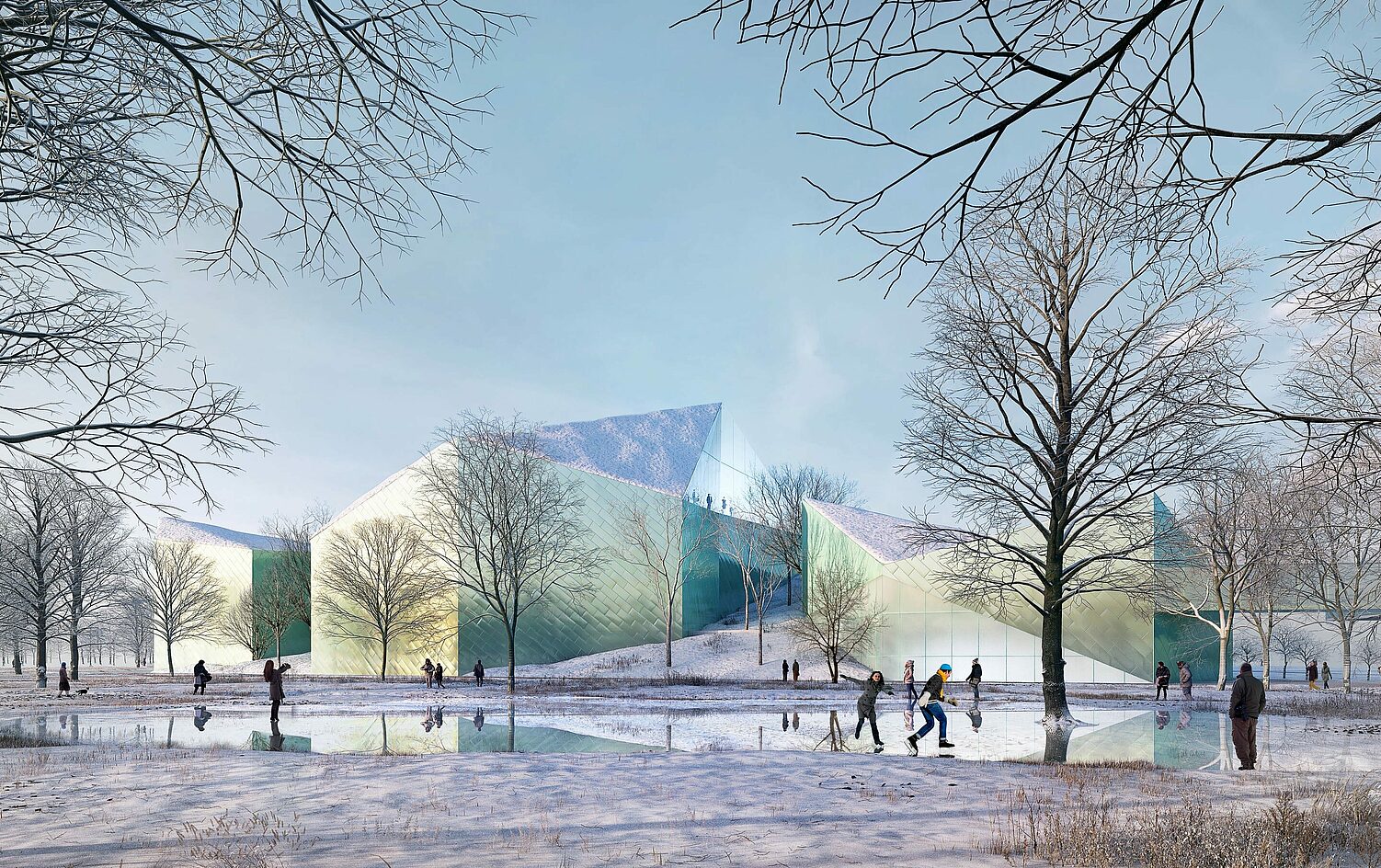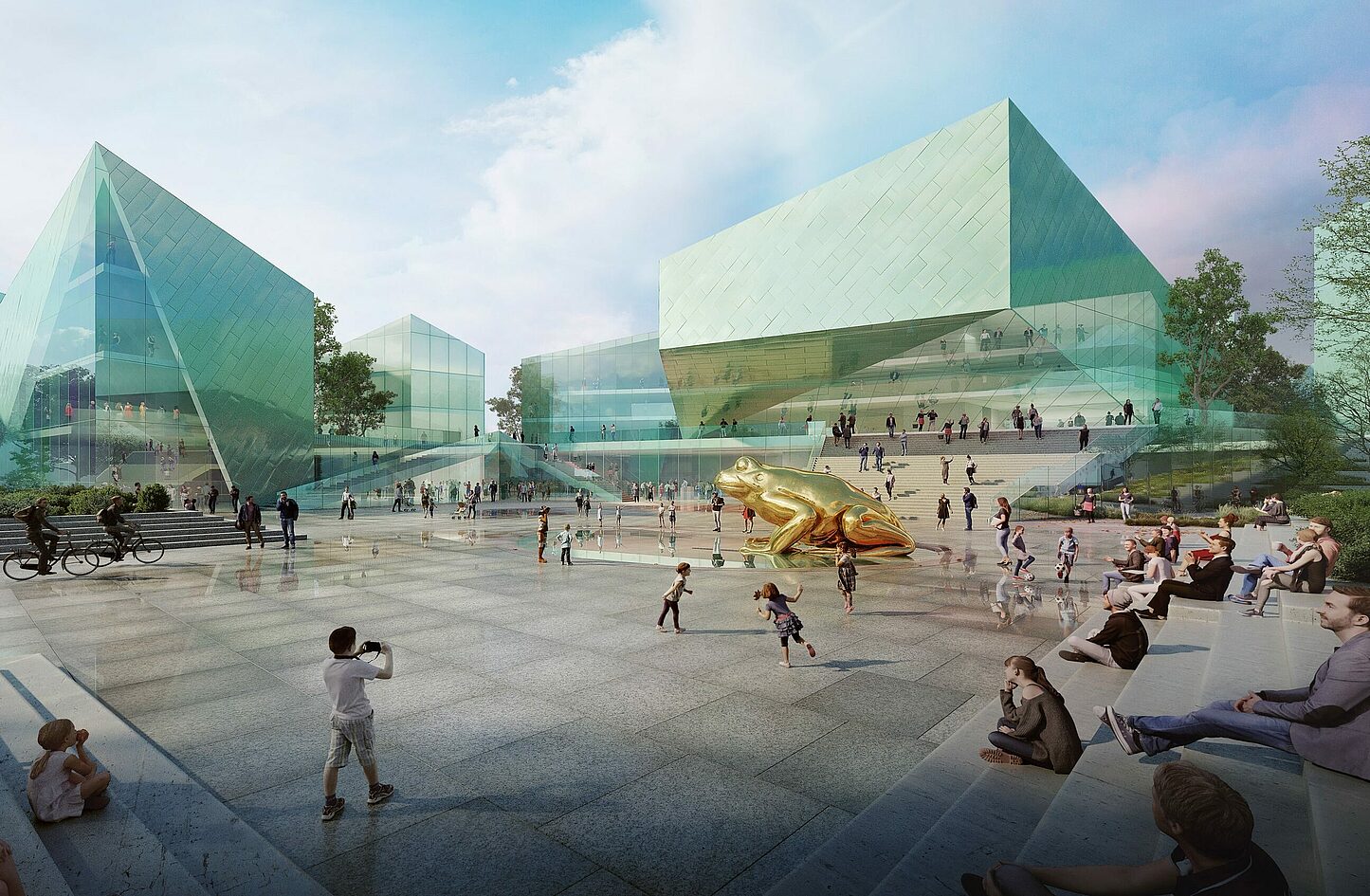
More content

Baumschlager Eberle Architekten recently won first prize in a two-stage competition for the Camerimage European Film Centre in Toruń, Poland. With a total of 42 participants in the first stage and five in the second, the competition was numerous and high-ranking. The second prize went to the Japanese firm Kengo Kuma with their partner K. Ingarden, J. Ewy Architekci Co.
The construction of the new film centre, the annual highlight of which is a festival, represents the largest investment in the cultural sector in Poland with construction costs of around € 120 million. The costs are largely borne by the Polish government and the city of Toruń. Completion is planned for 2025.
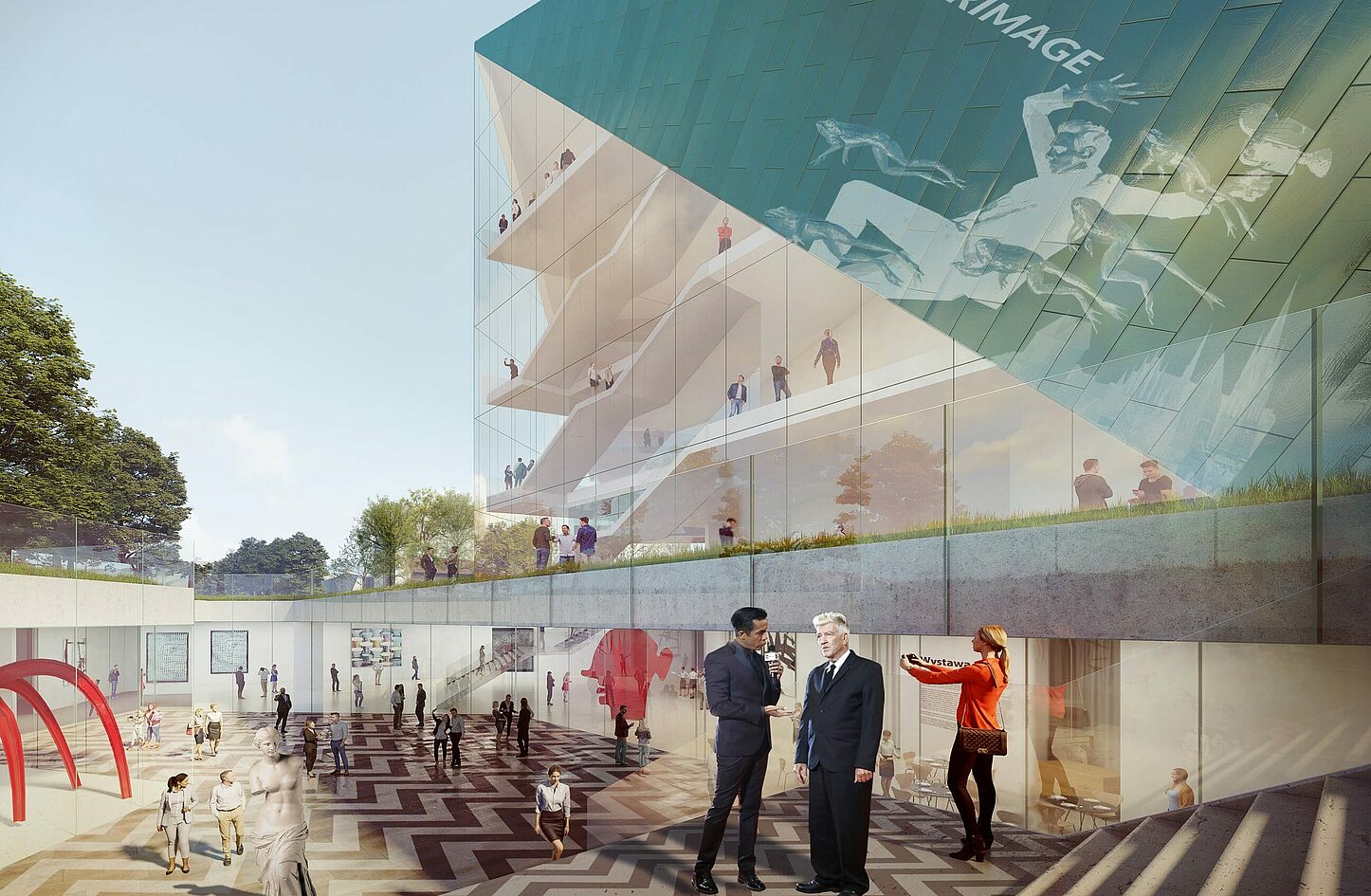
National & International
There aren't many places in Poland where a world-class cultural event comparable to Cannes or the Oscars could take place. Due to the annual film festival, Toruń was proposed for it. The Camerimage Centre with its festival hall and the accompanying infrastructure for film production and screening is definitely a step in this direction. The Camerimage Film Centre has the potential to be a place of promotion of Polish film and a place of lively cultural exchange with a global reach. For these reasons, the entire project is co-financed by the Polish government. In contrast to the prominent festivals with their celebrity image, the festival in Toruń focuses on the people involved in the production side of filmmaking.
Especially for camera women and men, the award of the “Golden Frog” as a counterpart to the Oscar is an indicator of the quality of their work. The new Camerimage Centre is symbolically guarded by a mighty “Golden Frog”, who appears in the legends of the city on the Vistula.
In the immediate vicinity of the Camerimage Centre is the Jordanki Culture and Congress Centre, designed by Fernando Menis. The existing and future ensemble will enrich the planning area as a "cultural district" with a new quality as an architectural and public space.
Toruń, a city west of Warsaw with a population of around 200,000 and a wonderful historical legacy from the Middle Ages, is preparing for its future as the country's cultural hotspot.
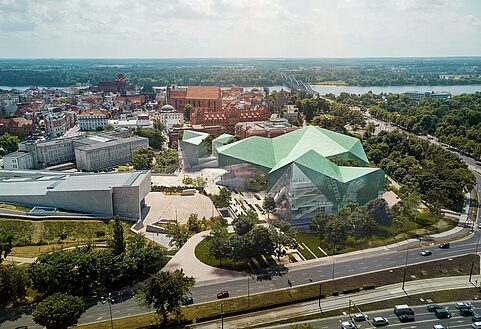
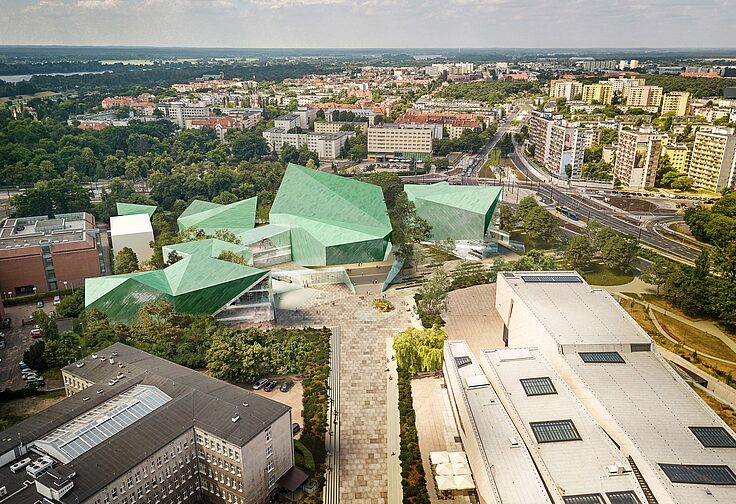
National & International
After the two music centres in Luslawice and Krakow from our office be ddjm Krakov, the film centre is another contribution in the field of architecture for cultural buildings. The project was created in cooperation between the offices in Lustenau and Krakow.
For Baumschlager Eberle, the dimension of the new project also counts. With construction costs of around € 120 million and around 41.165 square meters of gross floor area, it represents a quantum leap: Far beyond the borders of Poland, it is Baumschlager Eberle's first construction project of this size in the cultural sector. Our Krakow office be ddjm Krakóv has gained experience and competence over the years. The most recent projects include the music centres in Luslawice (completed) and Krakow (in planning), which have cemented reputation of Baumschlager Eberle Architekten in the cultural sector in Poland.
In other typologies - for example in administrative buildings - Baumschlager Eberle Architekten have already been able to develop a considerable number of buildings of a similar size over the years.
The project is linked to a very important world-class cultural event: the Camerimage Festival - this means that every year the building will be the backdrop for a major international media event. As a hub of the film industry, the festival opens up the possibility of increasing awareness of the Baumschlager Eberle Architekten brand worldwide.
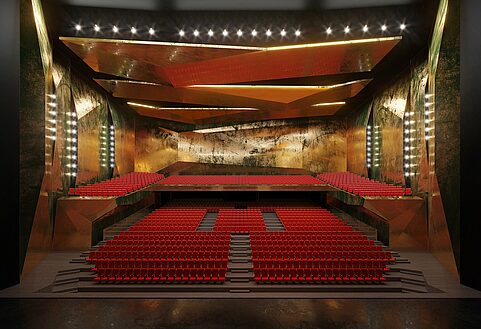
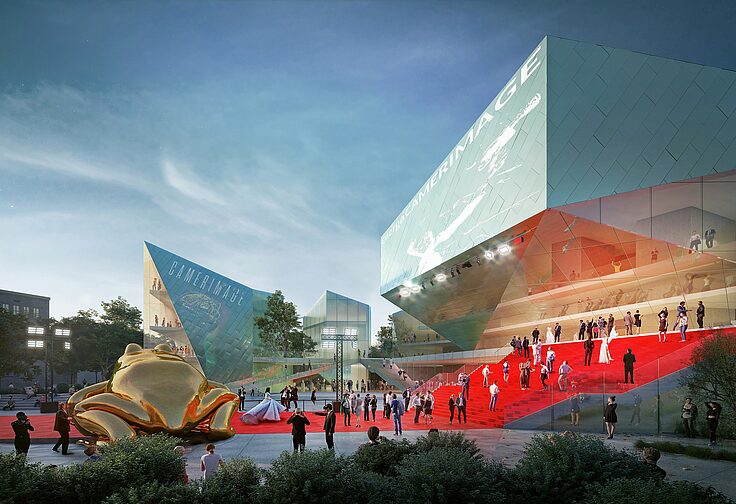
The Creator of the festival is Mr Marek Żydowicz
Architecture:
Harmoniously integrated into the city's green belt, the new building composition complements the historic city centre of Toruń. This makes the project a natural part of the city and a new highlight for the future. In concrete terms, the future means that a film studio, a training centre, the actual festival hall, a presentation forum for the film industry, cinemas and an underground film museum will be built here in stages.
Thematically, the crystalline part of the architecture represents the finishing touch of nature. The buildings symbolize six “stones in the park” in order to achieve the union of nature and architecture. The crystalline architecture also means openness and unity, with a view of the city and comfort in the dark of the cinema halls. The choice of materials is also appropriate: glass and coloured metal form a high-contrast surface for the building, the significant geometry of which characterizes the specific location.
The film centre is ambivalent in its use: It functions as a green outdoor space for the population, it is used in everyday life and is a meeting place for international filmmakers once a year. Prof. Dietmar Eberle said: “The project reflects our fundamental approach to designing architecture for everyday life. In an authentic way, a high practical value is brought into harmony with the poetic interpretation of the location and the added cultural value of the building”.
As a future user, Marek Żydowicz, Director of the EnergaCAMERIMAGE International Film Festival, characterizes the importance of the project from his point of view:
“It is the building that will be in public ownership. It will function 365 days a year and will not serve only the needs of the festival, but it will have a year-round program, not only in terms of film screenings, but also exhibitions. There will also be commercial activities related to the market and an education centre. This building will be the first place in Poland where world premiere events can be held. Therefore, it must be a unique building”.
The competition jury justified its decision in favour of the Baumschlager Eberle Architekten project with the fulfilment of all requirements for a multi-layered functional program and the importance for the city of Toruń: The concept of the multifunctional common rooms fits harmoniously into the desired typology of the scattered buildings. This enables an appropriate spatial relationship to the fairground and the park. The dynamic shapes of the buildings offer the opportunity to create a distinctive, modern landmark in Toruń.
Phasing
One of the great advantages of the Baumschlager Eberle Architekten project is the possibility of completing the project in stages. The building plan includes a film studio, the learning centre, the “shop” as a presentation centre for the film industry as well as the large festival hall, the cinema centre and the underground film museum.
On the basis of winning the competition, Baumschlager Eberle Architekten are negotiating further cooperation with the public sector and the Camerimage Centre. The completion of the ensemble is expected in 2025.
The design team at Baumschlager Eberle Architekten:
Prof. Dietmar Eberle, Hugo Herrera Pianno, Mateusz Dudek, Melanie Ghanem, Johannes Burtscher, Maria Jose Rodriguez de Vera Guardiola, Agnieszka Miecznikowska, Aleksandra Śliwa, Gabriela Kasperkiewicz.
Lustenau (AT) and Krakow (PL) in September 2021
